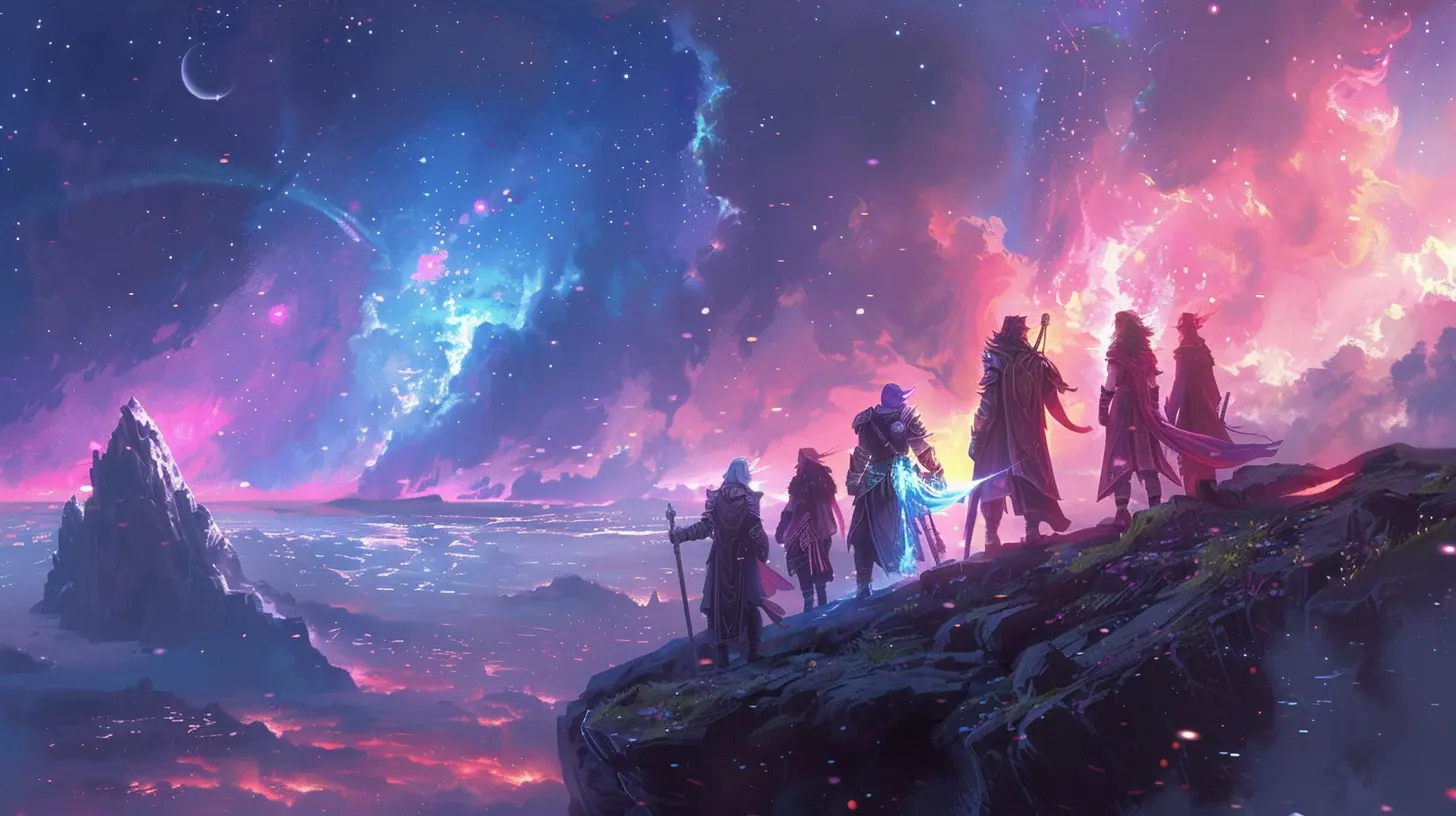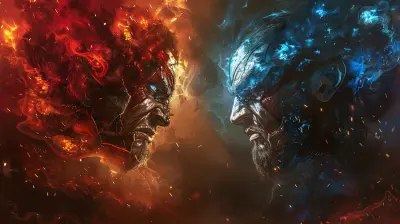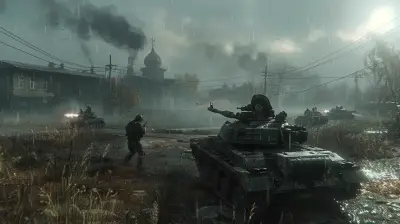Developers Share Their Vision for Games As a Service
18 May 2025
The world of gaming is a lot like a buffet. You start with something small—maybe a bite-sized platformer or a cozy indie game—then suddenly find yourself knee-deep in an all-you-can-eat fiesta of loot boxes, battle passes, and limited-time events. Welcome to the age of Games As a Service (GaaS), a.k.a. the gaming industry's version of a Netflix subscription that keeps you coming back for more.
But what exactly do developers think about this trend? Are they cooking up games to be the next Fortnite or Warframe? Are they scheming up new ways to make us open our wallets, or is this model truly about creating community-driven, living works of art? Spoiler alert: it’s probably a little bit of both. Grab your RPG gear and saddle up because we’re diving into what developers have to say about their GaaS dreams. 
What the Heck is Games As a Service Anyway?
Before we hit the nitty-gritty developer thoughts, let's clear the air. GaaS isn’t just a fancy buzzword that execs throw around in investor meetings to sound cool. It's a business model where games aren't just "one and done" purchases. Nope. Instead, they evolve over time with updates, expansions, new content, and sometimes, yes, microtransactions.Think of it this way: buying a traditional video game is like getting a burger from a food truck. It's tasty, fulfilling, and you go on your merry way. GaaS, on the other hand, is like signing up for a gym membership where they keep adding new equipment, group classes, and the occasional protein shake stand. Sure, you might shell out more over time, but hey, look at all the shiny new things! 
Developers’ Vision: It’s All About the Journey
1. Create Communities, Not Just Games
Ask any developer working on a GaaS project, and they’ll probably tell you it’s not just about selling skins or battle passes (although that is a bonus). A lot of them see GaaS as a way to build communities.Take Bungie, for example, the folks behind Destiny 2. They’ve built an entire galaxy (literally) where players aren’t just shooting aliens; they’re forming clans, coordinating raids, and arguing about whether or not to nerf Gjallarhorn in the forums. Developers are no longer just saying, “Here’s a game. Have fun!” They’re saying, “Here’s a world. Let’s grow it together.”
Developers are essentially part-time architects and full-time party hosts. They roll out seasonal updates to keep the masses happy and hyped. It’s like when your favorite club introduces Ladies’ Night just as things were starting to feel stale. They want you to stick around and bring your friends.
2. Monetization: The Necessary Evil
Alright, let’s address the elephant-sized loot box in the room. Developers know monetization in GaaS games is a touchy subject—and by touchy, I mean it’s like trying to touch a porcupine wearing boxing gloves.Yes, microtransactions and battle passes are major revenue drivers, but developers argue there’s a method to the madness. GaaS takes a lot of upkeep—servers, patches, artist teams creating skins you'll spend $20 on because “it’s for a good cause.” All of that costs money.
But here’s the thing: most devs aren’t out to bleed players dry (at least not the good ones). They’re trying to strike a balance between making a profit and keeping the player base happy. After all, no one wants their game to turn into a ghost town faster than you can say “pay-to-win.”
3. Continuous Evolution
One thing developers are absolutely jazzed about is the ability to keep their games evolving. Remember back in the day when a game got released, and that was it? Find a bug? Tough luck. Want new content? See you in five years when the sequel comes out.With GaaS, developers can roll out updates faster than a pizza delivery guy on a Friday night. New maps? Done. Fresh characters? Coming right up. A patch to fix that one broken weapon your friends won’t stop using against you? Finally.
Epic Games, the creators of Fortnite, are a prime example of this. They’re out here flipping the script with new seasons, world-ending events, and TikTok dances. The game you play today might look nothing like the one from three years ago, and honestly, that’s half the fun.
4. Player Feedback is (Finally) King
One big perk of the GaaS model is that developers can actually listen to their players and adjust accordingly. It’s kind of like being a chef at a fancy restaurant. If everyone spits out the new dish you just served, you’re probably not making it again.Developers have all kinds of tools to gather feedback, from Reddit threads to Twitter polls to in-game data analytics that track how many times you rage-quit a match. And the best part? They don’t have to wait until the next game in the franchise to fix things.
It’s a two-way street, though. Players get to influence how games evolve, but developers have to juggle pleasing the die-hard fans while also attracting new ones. It’s like trying to host a house party where your karaoke-loving aunt and EDM-obsessed cousin-in-law are both satisfied. 
But Is GaaS All Sunshine and Rainbows?
Let’s not kid ourselves; GaaS isn’t perfect. While the idea of an ever-evolving game sounds cool in theory, sometimes it can feel like a full-time job just trying to keep up. And don't even get me started on FOMO (fear of missing out).Missed last season’s limited-time event? Tough luck, pal. That exclusive skin is gone forever, and you’ll have to settle for the knock-off version in the shop next year. FOMO is real, and developers know how to use it to keep players engaged (and spending).
Then there’s the whole burnout factor. We all love content updates, but at what cost? Developers working on GaaS titles often face insane pressure to churn out content faster than we can say “patch notes.” Crunch culture isn’t only a problem for GaaS games, but the constant need for fresh content certainly doesn’t help. 
So, What’s Next for GaaS?
Developers have big dreams for the future of Games As a Service, and it goes far beyond making us shell out $10 for a new emote. They’re talking about more immersive storytelling, cross-platform play to unite players, and using AI to create dynamic worlds that adapt to how we play.Some even envision using GaaS to tackle real-world issues. Imagine playing a game where your actions in a virtual world could directly impact, say, environmental conservation efforts. Sounds wild, right? But hey, if video games can raise millions for charity with a Twitch stream, anything’s possible.
Final Thoughts: GaaS is Here to Stay
Whether you see Games As a Service as the future of gaming or just a sneaky way to nickel-and-dime players, one thing’s for sure—it's not going anywhere. Developers are constantly refining their vision, blending creativity with capitalism to deliver experiences that keep us hooked.At the end of the day, GaaS is like an endless game of Jenga. Devs stack more and more onto the tower, hoping it doesn’t all come crashing down. And as players, we’re just here for the ride, hoping the next update doesn’t nerf our favorite weapon into oblivion.
So, what’s your take? Are you loving the constant updates, or are you ready to rage-quit the whole GaaS trend? Drop a comment below—because remember, even in the world of gaming, your opinion matters.
all images in this post were generated using AI tools
Category:
Gaming NewsAuthor:

Tayla Warner
Discussion
rate this article
4 comments
George Sheppard
Games as a Service is the future—developers must prioritize player engagement and innovation to create dynamic, evolving experiences that keep us coming back.
June 17, 2025 at 4:36 AM

Tayla Warner
Absolutely! Prioritizing engagement and innovation is key to creating lasting player experiences in the Games as a Service model.
Thistle McGill
Absolutely agree with the developers’ vision! Games as a Service redefine player engagement and community building. This approach not only enhances longevity but also fosters innovation. Excited to see how this model evolves and shapes the gaming landscape. Keep pushing boundaries!
May 25, 2025 at 4:50 AM

Tayla Warner
Thank you for your insight! We are equally excited to see how Games as a Service will continue to transform player experiences and community dynamics.
Lucas Webster
Exciting times ahead! Let the gaming adventures begin!
May 23, 2025 at 3:47 AM

Tayla Warner
Absolutely! The future of gaming promises thrilling experiences and endless adventures. Let's dive in!
Azriel McClendon
This article offers valuable insights into the evolving landscape of Games as a Service. The developers' perspectives highlight the importance of community feedback and continuous content updates. I appreciate their commitment to enhancing player engagement and fostering long-term relationships. Excited to see how these visions will shape future gaming experiences!
May 18, 2025 at 3:40 AM

Tayla Warner
Thank you for your thoughtful comment! I'm glad you found the insights valuable and share the excitement for the future of Games as a Service. Your support for community engagement is greatly appreciated!



